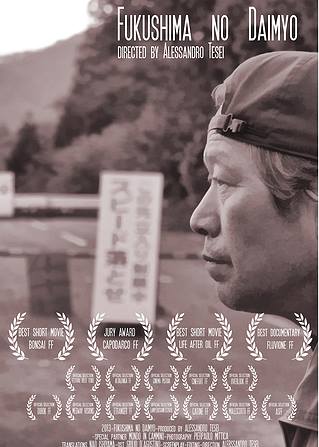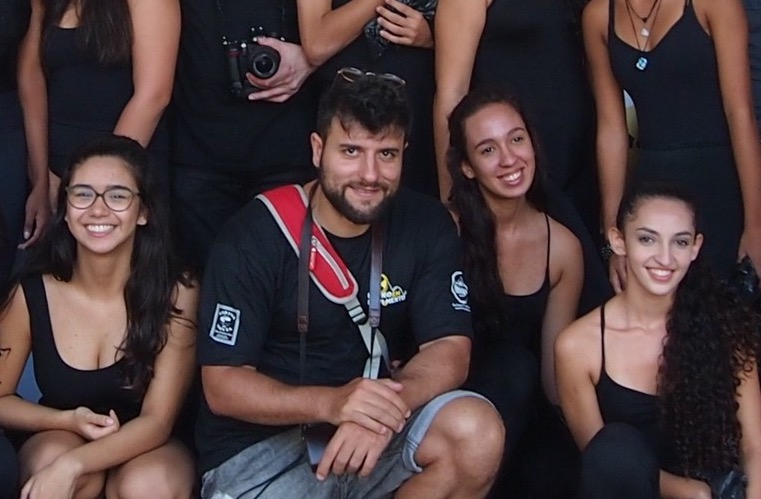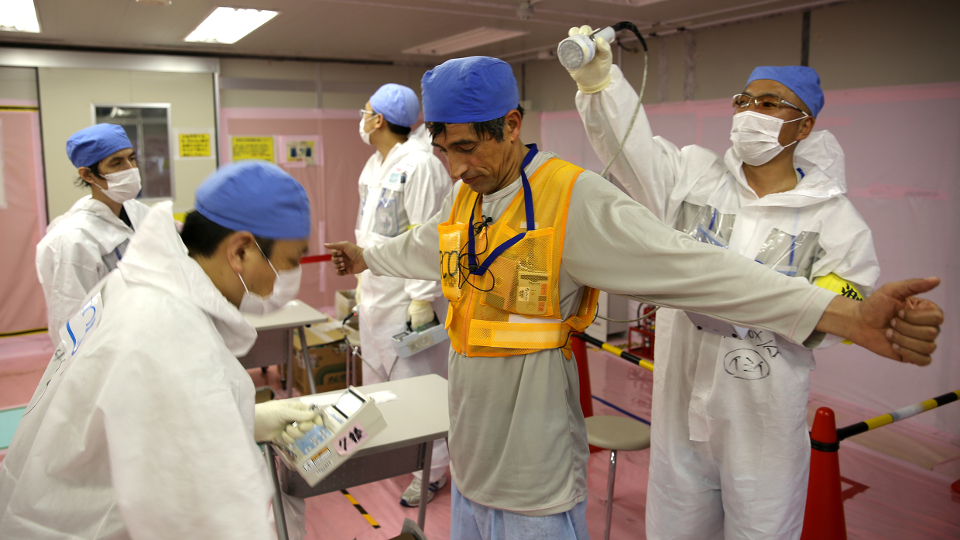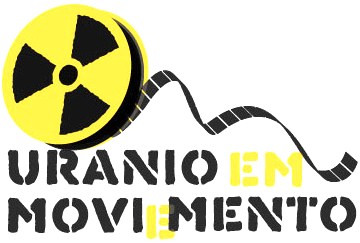Fukushima nicht vergessen lassen - 10 Jahre Reaktorkatastrophe von Fukushima
Zum Jahrestag der Atomreaktorkatastrophe von Fukushima zeigt das Internationale Uranium Film Festival gemeinsam mit der Kinemathek des Museums für Moderne Kunst von Rio de Janeiro (MAM Rio) zwei prämierte Dokumentarfilme über Fukushima online. Ausgewählt wurden der poetische Kurzfilm „FUKUSHIMA NO DAIMYO" des italienischen Fotografen und Filmemachers Alessandro Tesei sowie die WDR-Dokumentation des in Deutschland weit bekannten Wissenschaftsjournalisten Ranga Yogeshwar „RANGA YOGESHWAR IN FUKUSHIMA - JAPANS KAMPF GEGEN DIE RADIOAKTIVITÄT“. https://mam.rio/programacao/10-anos-do-acidente-nuclear-em-fukushima/
Beide Filme sind nun online bis zum 18. März - kostenlos hier https://vimeo.com/522316316 und hier https://vimeo.com/522311583
„Unser Fukushima-Event im März ist quasi der Probelauf für unser Internationales Uranium Film Festival, das in diesem Jahr vom 20. bis 30. Mai wegen der andauernden Corona-Restriktionen erstmals online stattfinden wird“, erläutert Festivaldirektor Norbert G. Suchanek. „Aus Anlass des Inkrafttreten des UN-Vertrags über das Verbot von Kernwaffen (TPNW) am 22. Januar diesen Jahres ist neben Fukushima auch die Geschichte der Atombomben und ihr Einsatz ein Schwerpunkt des Festivals in diesem Jahr.“
Zu den Filmen
 Fukushima No Daimyo, Italy, 2014, Director: Alessandro Tesei, documentary, 20 min, Japanese with subtitles in Portuguese or in English
Fukushima No Daimyo, Italy, 2014, Director: Alessandro Tesei, documentary, 20 min, Japanese with subtitles in Portuguese or in English
Almost two years after the accident in Fukushima, Masami Yoshizawa, a cattle farmer who refused to leave the forbidden zone, explains what has become his mission in the life he has left. His land is contaminated forever. However, he remains on his farm and works to make the tragic consequences of radioactive exposure known around the world. His speech is the centre of this poetic short film, made during the second trip by Italian filmmaker Alessandro Tesei to Japan, with photographer Pierpaolo Mittica and researcher Michele Marcolin. They wanted to understand the changes that were taking place in the forbidden zone. Trailer and more: http://www.alessandrotesei.com/portfolio/fukushima/
Awards:
- BEST SHORT MOVIE, Bonsai Film Festival 2014 (Italy)
- JURY AWARD, Capodarco Film Festival 2014 (Italy)
- BEST SHORT MOVIE, Life after Oil Film Festival 2014 (Italy)
- BEST DOCUMENTARY, Fluvione Film Festival 2014 (Italy)
- II PLACE, Cielocorto FF 2014 (Italy)
- BEST DOCUMENTARY JAPAN, PiGrecoZen FF 2015 (Italy)
- SPECIAL MENTION - International Uranium Film Festival 2015 (Brazil)
- BEST ITALIAN DOCUMENTARY, GeoFilmFestival 2016 (Italy)
 About Director Alessandro Tesei: Graduated in visual and multimedia arts from the Macerata Academy of Fine Arts, with a thesis on the social importance of documentary. Inspired by masters like Herzog, Pasolini, Ciprì and Maresco, he decided to follow the path of investigative documentary. After a few years of experimenting with various artistic disciplines, such as sculpture, performance, theater, he started to dedicate himself essentially to photography and video. In 2011, after the Fukushima accident, Tesei began to investigate and to tell the story of people who live in radioactive contaminated areas. From that experience, the first feature film "Fukushame - Lost Japan" was born. In 2012, he returns to Fukushima Prefecture to document the reopening of part of the evacuated area and to interview one of the people who symbolised the disaster, the farmer Masami Yoshizawa. He is the protagonist of his short film "Fukushima no Daimyo". Photo: Alessandro Tesei at the Uranium Film Festival Rio de Janeiro, 2016
About Director Alessandro Tesei: Graduated in visual and multimedia arts from the Macerata Academy of Fine Arts, with a thesis on the social importance of documentary. Inspired by masters like Herzog, Pasolini, Ciprì and Maresco, he decided to follow the path of investigative documentary. After a few years of experimenting with various artistic disciplines, such as sculpture, performance, theater, he started to dedicate himself essentially to photography and video. In 2011, after the Fukushima accident, Tesei began to investigate and to tell the story of people who live in radioactive contaminated areas. From that experience, the first feature film "Fukushame - Lost Japan" was born. In 2012, he returns to Fukushima Prefecture to document the reopening of part of the evacuated area and to interview one of the people who symbolised the disaster, the farmer Masami Yoshizawa. He is the protagonist of his short film "Fukushima no Daimyo". Photo: Alessandro Tesei at the Uranium Film Festival Rio de Janeiro, 2016
 RANGA YOGESHWAR IN FUKUSHIMA - JAPANS KAMPF GEGEN DIE RADIOAKTIVITÄT (RANGA YOGESHWAR IN FUKUSHIMA. JAPAN’S FIGHT AGAINST RADIOACTIVITY) - Germany, 2014, Directors: Reinhart Brüning, Ranga Yogeshwar, Thomas Hallet, Wolfgang Lemme, Production WDR, Documentary, 43 min. English with Portuguese subtiitles. / oder in der Originalfassung in Deutsch.
RANGA YOGESHWAR IN FUKUSHIMA - JAPANS KAMPF GEGEN DIE RADIOAKTIVITÄT (RANGA YOGESHWAR IN FUKUSHIMA. JAPAN’S FIGHT AGAINST RADIOACTIVITY) - Germany, 2014, Directors: Reinhart Brüning, Ranga Yogeshwar, Thomas Hallet, Wolfgang Lemme, Production WDR, Documentary, 43 min. English with Portuguese subtiitles. / oder in der Originalfassung in Deutsch.
Famous science TV-journalist Ranga Yogeshwar has gained extensive access to Japan's battered Fukushima power plant. The spectacular report gives an oppressive and impressive insight into the current situation on site at the Fukushima reactor. The report also shows the everyday life of the people who are still living in the exclusion zone. Ranga Yogeshwar respects the efforts of the Japanese to contain the nuclear disaster. Fukushima and the entire Japanese society will never be what they were before the accident. Award: Special Recognition of the International Uranium Film Festival 2015
 About Director Ranga Yogeshwar
About Director Ranga Yogeshwar
Ranga Yogeshwar is a presenter and co-producer of a science program in German TV. He grew up in India (Bangalore) and Luxembourg, studied at the RWTH Aachen in Aachen, Germany, graduating with a Diplom degree in experimental physics, worked at the Swiss Institute for Nuclear Research (SIN), at CERN, both in Switzerland and at the Forschungszentrum Jülich in Germany. He started his journalistic career in 1983, becoming one of Germany's leading scientific TV journalists. He was editor of the German public TV WDR and headed the science department. Untill today Ranga received more than 60 awards, such as the honorary doctorate from the University of Wuppertal, the Order of Merit of the Federal Republic of Germany, Order of Merit of the State of North Rhine-Westphalia and the Order of Merit of the Grand Duchy of Luxembourg.
Das Uranium Film Festival ist nur dank Unterstützung von freiwilligen Helfern, Spendern und Sponsoren möglich. Bitte unterstützen Sie uns!
Kontakt:
International Uranium Film Festival
info@uraniumfilmfestival.org
Videos über das Festival
- Uranium Film Festival in Berlin 2020 - https://www.youtube.com/watch?v=Af8JgEHPq78
- Uranium Film Festival in Window Rock 2018 - https://www.youtube.com/watch?v=lubVjq16UJg&t=13s
- Uranium Film Festival in Rio 2016 - https://mundosustentavel.com.br/uranium-film-festival/
- Uranium Film Festival in Hollywood 2016 - https://www.youtube.com/watch?v=esAL9e-RZxk&t=21s
- Uranium Film Festival in Canada 2015 - https://www.youtube.com/watch?v=LKv_oSmM154
- Uranium Film Festival in Rio 2014 - https://www.dw.com/pt-br/radioatividade-vira-tema-de-festival-de-cinema/...
- Uranium Film Festival in Amman 2014 - http://aramram.com/Nuclear_Camera








